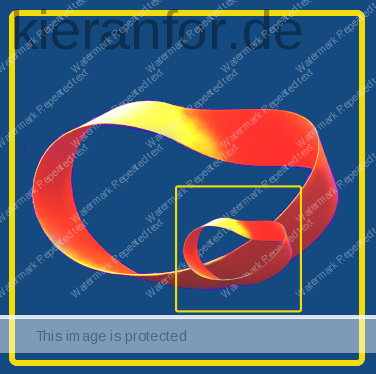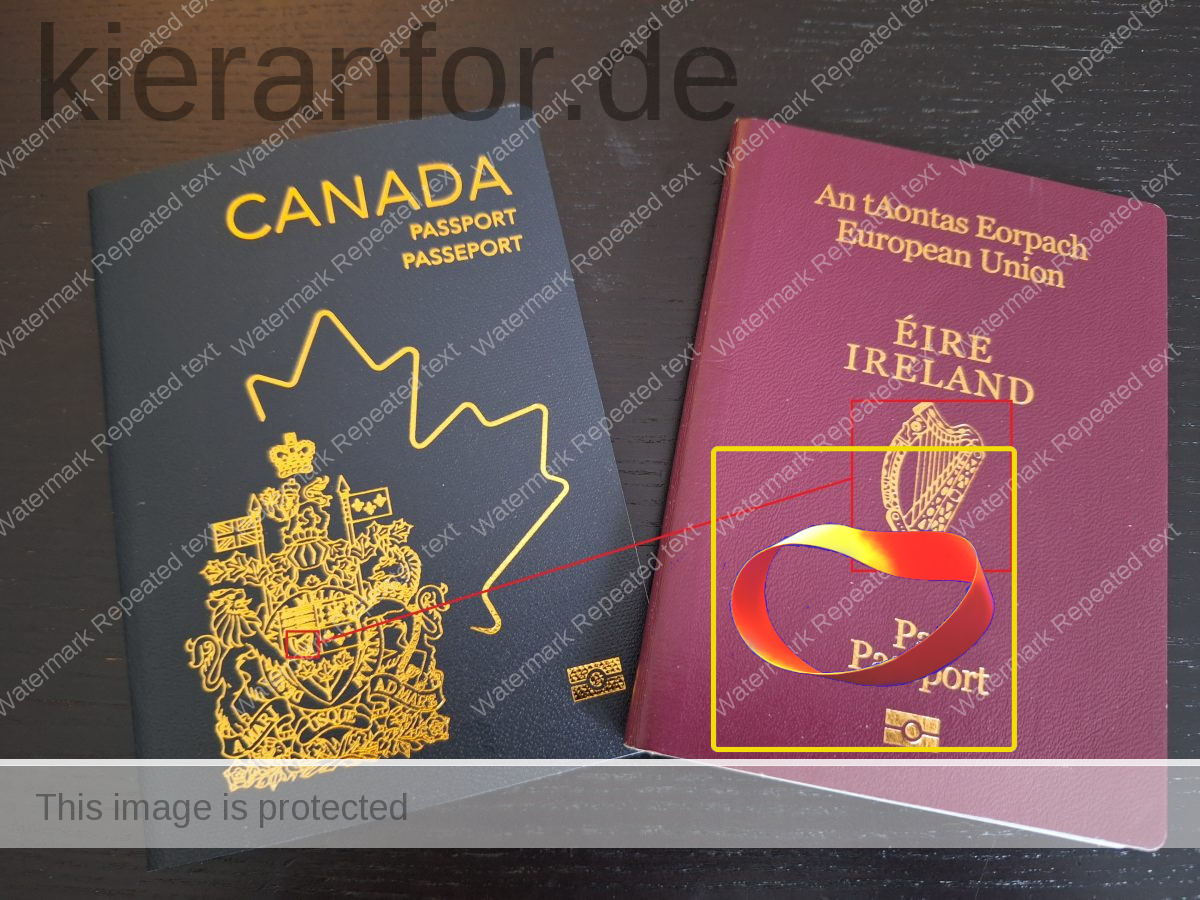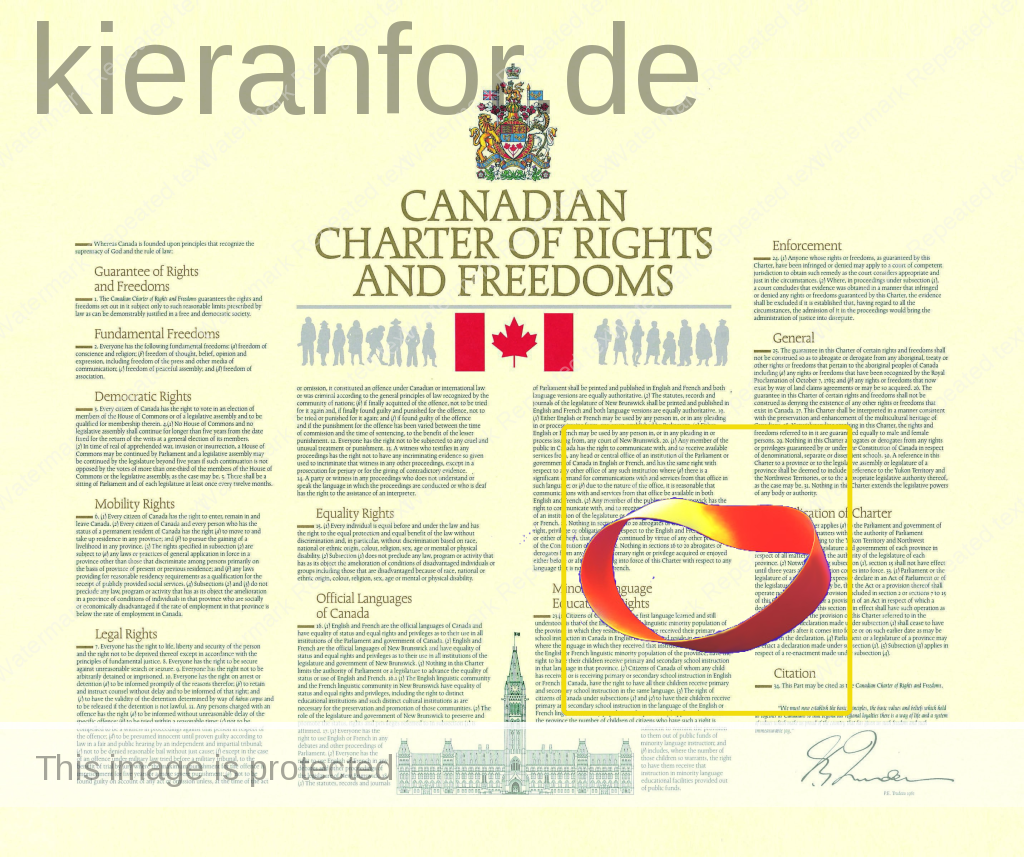Receiving my Canadian passport last week and seeing the Canadian Coat of Arms on its cover, I was again struck by seeing the appropriated symbols of my country of birth on another document that embodies what it means to be Canadian.
🍁At the outset, let me be clear: I am grateful that I have been allowed to become a Canadian citizen. My experience of Canadians before coming here in 2017, and my time in Canada and around Canadians since then, has made it clear to me that that this is a country I can be proud to be part of. 🍁
☘️ Now, while I was born and raised Irish, I don’t feel like I can say “I’m proud to be Irish”: this was an accident of birth, completely out of my control. I am proud of Ireland, and of certain Irish people for various reasons but, in my case, being “proud to be Irish” makes as much sense as me being proud to be right-handed. ☘️
In contrast, it was a choice to become Canadian and I took time to consider what that would mean. As a Canadian citizen, I continue to think about this, both as an exploration of my own identity but also as part of my civic responsibility. For while I am proud of being Canadian, there are issues, both historical and contemporary [often these are intertwined], that I need to explore as part of my evolving identity.
Below, I’m going to gather some of the notes I’ve made on this topic, as an effort to make it more coherent. This is part of “the work” and I am also interested in making this work (somewhat) public, as I delve deeper into these issues.
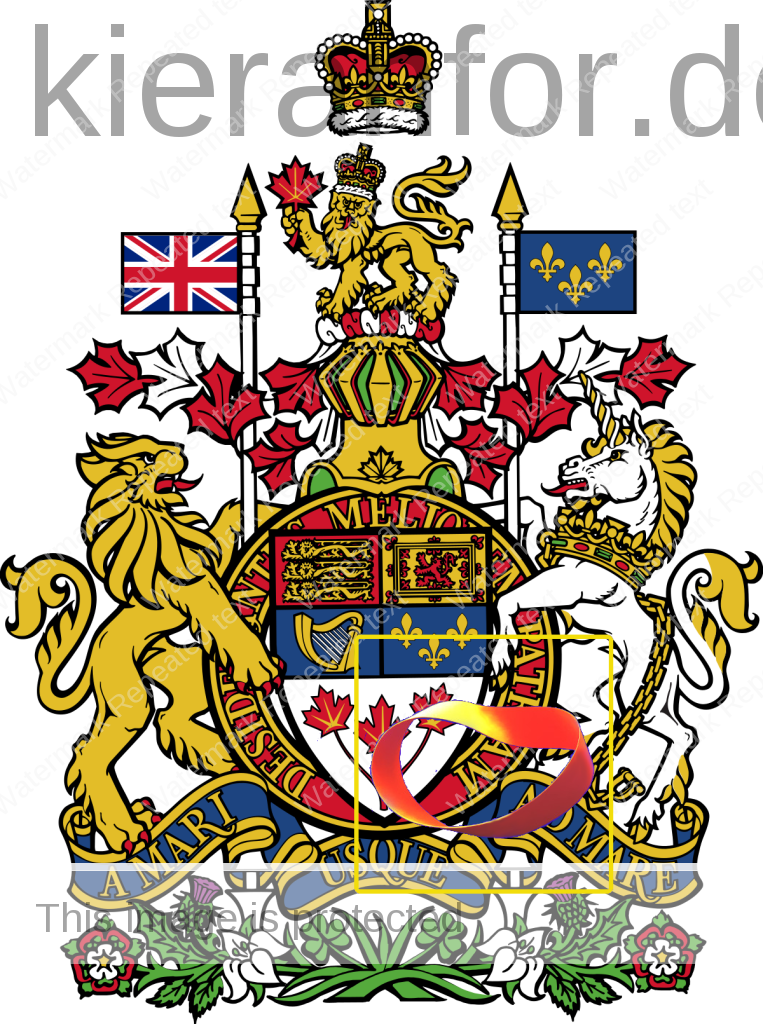
Click above to read a full description of the coat of arms (note the Scottish unicorn)
Settler
My Indigeneity 101 page is probably a good place to anchor this, as my relationship with Canada has changed since I first came for a visit in 2014.
Below is how I tried to explain this change, written in 2023 in a doc titled “Settler” (I’d likely have added a question mark if Word allowed these in the filenames)
- In 2014, we visited Canada as tourists; we met some friends, had some meals, took some pictures, and left.
- In 2017, we moved to Canada as “uninvited visitors” or “uninvited guests”
- We didn’t have a long-term plan when we got here so I never really felt like this was home; it was just another place I was passing through on my way to somewhere else. After I finished my MEd, I began my PhD and committed to spending, at least, several more years here.
- During this time, I did not, initially, pay particular attention to the history of the land I was living on or to my own positionality in relation to First Nations and settler Canadians. I was an Irishman, passing through a land with a troubled history that neither I nor, as far as I know, any of my ancestors had a hand in creating. Land acknowledgements seemed bizarre to me at first, but I came to understand that there is a time and a place and a way to give these in a meaningful way. I recall (former) Dean Frank’s addition to the standard UBC land acknowledgement: “UBC Vancouver is located on the traditional, ancestral, unceded, and occupied territory of the Musqueam people.” It stopped me dead. That term carried a lot more weight for me than the others; it was familiar. I also became friendly with some Indigenous people and became proactive about learning about Indigenous history and the formation of Canada. Though I was “uninvited”, it seemed like the right thing to do as a visitor/guest: to take an interest in where I was and to learn about those who had been there for many generations before me.
- In 2021, we became permanent residents of Canada and my relationship with this land changed; I became culpable. No longer passing through, I now had paperwork that allowed me to come and go freely on this land that had been taken from others; I became an occupier.
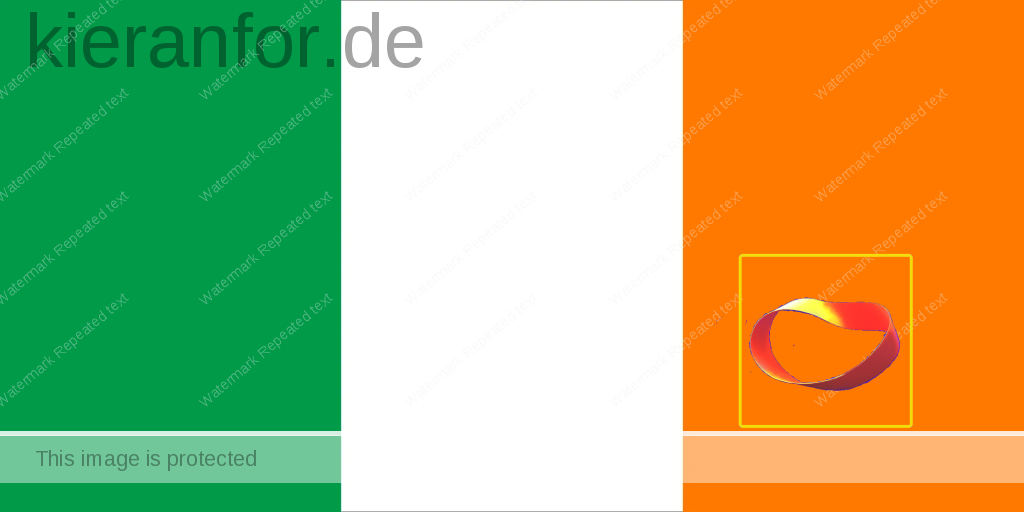
- In 2023, I will be eligible to become a Canadian citizen; I may become a settler. What does this mean? I might gain a passport and a hyphen and become Irish-Canadian. To do so, I would have to swear to “bear true allegiance” to the Crown that had begun a long campaign to subjugate my own people 500 years before they ever set foot in North America. “Settlers” sent by this crown to my country in the early 1600s, in an attempt to “civilize” (i.e. Anglicize) my people, are still present (i.e. in Northern Ireland).
- Of course, they have been there for centuries, and it is their home now too: for better or worse, we are going to have to work toward our own process of reconciliation so that we will be able to live together in a united Ireland, something that has become somewhat of an inevitability due to overlapping demographic, economic, and political realities. They are “settlers” no more.
Out of Ireland have we come.
WB Yeats: Remorse For Intemperate Speech
Great hatred, little room,
Maimed us at the start.
I carry from my mother’s womb
A fanatic heart.

- In March 2023, I had a great chat with Nicholas Ng-A-Fook when he was here for the EDCP Seminar Series ⬅ In the session, I bounced off Bill Pinar’s question “if you’re unlearning to be an immigrant, is your only option to become a settler colonial?….” [32:31] and his summation that “…there’s no way out…” [36:50] by pointing out that while there may be no way out, there is most definitely a way in: by pledging allegiance to the Crown in order to become a citizen and as a result, in many ways, becoming culpable/complicit by joining in the settler colonial project.
- It sticks in my craw to think that this is the price that needs to be paid to become Canadian though, of course, others have similar, and greater, reasons to not want to have to take this oath.
- Both I and others would likely find it far more fitting to swear allegiance “to the people of, and the land that we call, Canada”, or something like that. After so many centuries of my countrymen fighting to liberate themselves from subjugation, it seems like something of a betrayal to now opt to become a subject of that same crown once again.
- ⭐ I also need to circle back to Nicholas and put the question to him again, about how he’d feel if he had to take the oath/make the pledge today.
(May 5, 2023) Alberta lawyer requirement to swear oath to king being challenged in court
https://globalnews.ca/news/9677175/alberta-lawyer-oath-king-legal-challenge/
(May 1, 2023) Time is right to scrap requirement to swear oath to the King, MPs and Senators say
https://www.theglobeandmail.com/politics/article-king-charles-oath-monarch-canada/ [https://archive.is/xlPwR]
(Sep 14, 2022) Indigenous MPP Sol Mamakwa declines to participate in oath to King Charles III
https://toronto.citynews.ca/2022/09/14/indigenous-mpp-sol-mamakwa-king-charles-oath/

- “Citizens for a Canadian Republic is a registered non-partisan, not-for-profit organization advocating the full Canadianization of the head of state.” https://www.canadian-republic.ca/about
The Charter
I have also been given pause for thought through my exploration of the Canadian Charter of Rights and Freedoms. This has centered on Section 2(b), Freedom of Expression, as it relates to K-12 teachers. I’ve presented on this several times, each time learning a little more as I prepare and reflect. Below is some writing I did on this in March 2022, describing how I engaged with a particular class.
- What I brought to the attention of the class is that, on the Charter document, primacy is actually given to the Royal Coat of Arm of Canada that sits (literally) above these laws, and atop that escutcheon lies “The Crown”.
- I explained to the class that I am approaching eligibility to become a citizen and that the pivotal point in this process is the Oath of allegiance to The Crown, currently in the form of “His Majesty King Charles the Third, King of Canada, his heirs and successors”.
- I then pointed out that, despite our land acknowledgements and all our talk of decolonizing, truth, and reconciliation, when you drill right down, the nexus of what it means to be a Canadian is the supremacy of the Dominion of the British Crown.
- Switching to third gear, I then brought their attention to the third division of the blazon where one can see an “azure a harp or stringed argent” signifying Ireland, added to the Coat of Arms of the United Kingdom in 1800 following the passing of the Act of Union, the formal annexation of Ireland by The Crown into the United Kingdom of Great Britain and Ireland.
- I also mentioned that the dexter flag is the Royal Union Flag, adopted following the Act of Union, where the red saltire (Saint Patrick’s Cross) was added to represent Ireland.
- I then explained that, when Ireland gained her independence in 1921, 750 years after the only Englishman to ever have served as a Pope ceded Dominion over Ireland to the British Crown in the Papal Bull Laudabiliter, it was determined that it would simply be too expensive to remove all references to Ireland from the flag and the coat of arms so they remain there, and by extension on the Canadian coat of arms, to this day.
- In closing, I said that these relics of empire that are so central to the Canadian identity might seem quite out of place to those coming to Canada from the 65 countries that claimed their independence from that same Crown. Perhaps, it is especially galling for the Irish who had their national emblem and a symbol of their patron saint appropriated into these colonial trappings that now serve as one more lingering legacy of colonisation.
- I will forever remember one student, who appeared to be of South Asian Heritage, vigorously finger snapping as I made these points. It was great to know I was having an impact on (at least!) one person in the room
The Crown
In March 2024, I received my Canadian passport and all the above came rushing back to to mind.
..despite our land acknowledgements and all our talk of decolonizing, truth, and reconciliation, when you drill right down, the nexus of what it means to be a Canadian is the supremacy of the Dominion of the British Crown.
KF
I’m about done here, for now, but my line above is what drives me to continue to explore my thoughts on this topic.
We build a house from the bottom up, but we deconstruct a house from the roof down.
It would seem logical that efforts at decolonization need to start from the top down and, in Canada, the Crown’s position at the top of representations of Canada make it a likely starting point for such discussions (not to mention, yet, the tools we might have available to do this)
Of course, I’m aware that the entire legal system (including treaties with First Nations) is based on a relationship with the Crown. While this might be held up as a reason we can’t disrupt this relationship, it may well be that this is the very reason why we must do so.
“Will replacing the monarchy with a Canadian head of state negatively affect treaties with Indigenous peoples?”
Citizens for a Canadian Republic
https://www.canadian-republic.ca/treaties
- I think of the (defeated) 2015-2016 referenda in New Zealand, proposing to change their flag

- I think of the recent news that Ontario will “allow” use of Indigenous languages in their legislature
- “Allow” FFS
- I think of Trutch Street every time I pass it, waiting to see the signpost changed to Musqueumview Street.
- (Sept 20, 2022) Musqueam gifts new name to City of Vancouver to replace Trutch Street
https://www.musqueam.bc.ca/renaming-ceremony-vancouver-trutch-street/ - (Oct 2023) Comments from the City of Vancouver
https://twitter.com/CityofVancouver/status/1709274692962709969
- (Sept 20, 2022) Musqueam gifts new name to City of Vancouver to replace Trutch Street
- I think of the the 2014 Ontario Superior Court ruling that specified: “In that oath [of allegiance], the reference to the Queen is symbolic of our form of government and the unwritten constitutional principle of democracy.” McAteer v Canada 2014
- This is also my understanding of the oath
[more to learn & add …]
Archive: https://archive.is/mXU6J; https://archive.ph/WJGm0;
